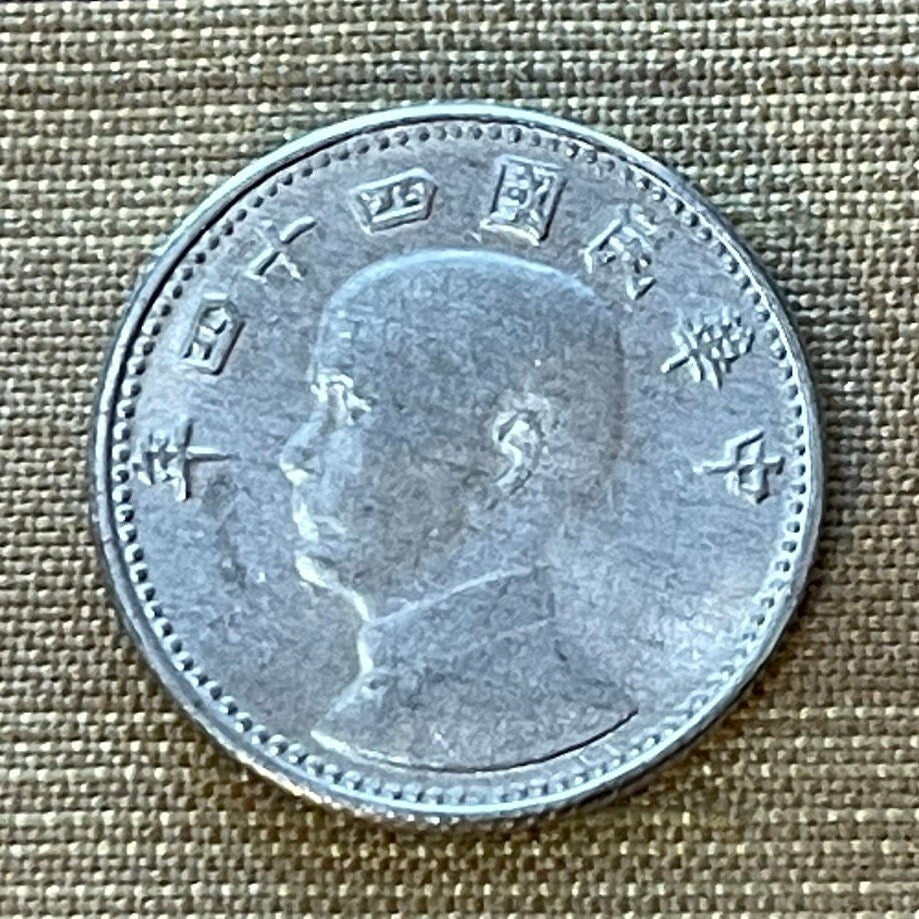elemintalshop
Sun Yat-sen & Taiwan Map 10 Cents Taiwan Authentic Coin Money for Jewelry (Republic of China) (Formosa) (Father of the Nation) 1955
Sun Yat-sen & Taiwan Map 10 Cents Taiwan Authentic Coin Money for Jewelry (Republic of China) (Formosa) (Father of the Nation) 1955
Couldn't load pickup availability
Sun Yat-sen & Taiwan Map 10 Cents Taiwan Authentic Coin Money for Jewelry and Craft Making (Republic of China) (Formosa) (Father of the Nation) (Forerunner of the Revolution)
Obverse: Bust of Sun Yat-sen left, date above
Lettering: 年四十四國民華中
Translation: Republic of China Year 44
Reverse: Map of Taiwan seperating denomination
Lettering:
臺
角 灣 壹
省
Translation: One Jiao
Taiwan Province
Features
Issuer Taiwan
Period Republic (1949-date)
Type Standard circulation coin
Year 44 (1955)
Calendar Chinese republican
Value 1 Jiao = 10 Fen (0.1 TWD)
Currency New dollar (1949-date)
Composition Aluminium
Weight 1.15 g
Diameter 19 mm
Thickness 1.89 mm
Shape Round
Orientation Medal alignment ↑↑
Demonetized Yes
Number N# 5648
References Y# 533, Schön# 3
WIkipedia:
Sun Yat-sen (/ˈsʌn ˌjætˈsɛn/; born Sun Deming; 12 November 1866 – 12 March 1925) was a Chinese statesman, physician, and political philosopher, who served as the provisional first president of the Republic of China and the first leader of the Kuomintang (Nationalist Party of China). He is called the "Father of the Nation" in the Republic of China, and the "Forerunner of the Revolution" in the People's Republic of China for his instrumental role in the overthrow of the Qing dynasty during the Xinhai Revolution. Sun is unique among 20th-century Chinese leaders for being widely revered in both mainland China and Taiwan.
Sun is considered to be one of the greatest leaders of modern China, but his political life was one of constant struggle and frequent exile. After the success of the revolution in 1911, he quickly resigned as President of the newly founded Republic of China and relinquished it to Yuan Shikai. He soon went to exile in Japan for safety but returned to found a revolutionary government in the South as a challenge to the warlords who controlled much of the nation. In 1923, he invited representatives of the Communist International to Canton to re-organize his party and formed a brittle alliance with the Chinese Communist Party. He did not live to see his party unify the country under his successor, Chiang Kai-shek, in the Northern Expedition. He died in Beijing of gallbladder cancer on 12 March 1925.
Sun's chief legacy is his political philosophy known as the Three Principles of the People: Mínzú (民族主義, Mínzú Zhǔyì) or nationalism (independence from foreign domination), Mínquán (民權主義, Mínquán Zhǔyì) or "rights of the people" (sometimes translated as "democracy"), and Mínshēng (民生主義, Mínshēng Zhǔyì) or people's livelihood (sometimes translated as "communitarianism" or "welfare").
*****
Wikipedia:
Taiwan, officially the Republic of China (ROC), is a country in East Asia. It shares maritime borders with the People's Republic of China (PRC) to the northwest, Japan to the northeast, and the Philippines to the south. The main island of Taiwan has an area of 35,808 square kilometres (13,826 sq mi), with mountain ranges dominating the eastern two-thirds and plains in the western third, where its highly urbanised population is concentrated. The capital is Taipei, which, along with New Taipei and Keelung, forms the largest metropolitan area of Taiwan. Other major cities include Kaohsiung, Taichung, Tainan and Taoyuan. With 23.57 million inhabitants, Taiwan is among the most densely populated countries in the world.
The political status of Taiwan is contentious. The ROC no longer represents China as a member of the United Nations, after UN members voted in 1971 to recognize the PRC instead. Meanwhile, the ROC continued to claim to be the legitimate representative of China and its territory, although this has been downplayed since its democratization in the 1990s. Taiwan is claimed by the PRC, which refuses diplomatic relations with countries that recognise the ROC. Taiwan maintains official diplomatic relations with 14 out of 193 UN member states and the Holy See, though many others maintain unofficial diplomatic ties with Taiwan through representative offices and institutions that function as de facto embassies and consulates. International organisations in which the PRC participates either refuse to grant membership to Taiwan or allow it to participate only on a non-state basis under various names. Domestically, the major political contention is between parties favouring eventual Chinese unification and promoting a pan-Chinese identity contrasted with those aspiring to formal international recognition and promoting a Taiwanese identity, although both sides have moderated their positions to broaden their appeal.
Share



















